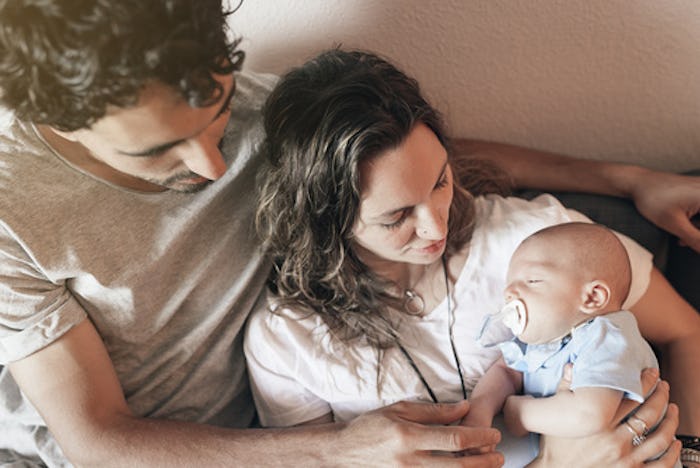Life

What You're Really Doing When You Ask A New Mom If She's "So In Love"
When my son was born, I assumed I’d be instantly flooded with feelings of love like I’d never known before. I had spent the last nine months bonding with him every chance I got. I talked to him. I played with him as he rolled and kicked against my stomach. I read books aloud for him, and I sang lullabies as I did dishes. He was so wholly wanted and so loved from the very beginning. But after a very long and difficult birth, I felt overwhelmed and numb. I remember feeling awe at the fact that I'd created a whole new person, but the love I expected was slow to grow.
Though I didn’t know it yet, I was about to dip into a yearlong battle with postpartum depression and anxiety. I loved my son, but it wasn’t the constant joy fest I had imagined when he was still in my belly. Our relationship was fraught, and we struggled with both colic and crying (from both me and him). Mothering was so much harder than I imagined, and I wasn’t anywhere near as good at it as I thought I would be. So when people would come to visit, cradling him admiringly and asking me as a new mom, “Are you so in love?” I really didn’t know what to say.
Of course, I said “yes,” because any other answer would have been unthinkable. I was supposed to be so in love with my baby. I was supposed to be enamored with his every move. The question wasn’t even really a question. It was a proclamation of how beautiful and instantly lovable my brand new baby was. Who could deny that?
I wasn’t perpetually bathing in his glorious perfection. I wasn’t adoring every painful moment of breastfeeding, or savoring the late-night feedings that made me feel like an absolute zombie.
With each person who asked me if I was “so in love," I felt a pang in my stomach. I loved my son, but it wasn’t the kind of love I was supposed to have, was it? Our bond wasn’t the stuff of legends. I wasn’t perpetually bathing in his glorious perfection. I wasn’t adoring every painful moment of breastfeeding, or savoring the late-night feedings that made me feel like an absolute zombie. I didn’t have endless patience for his colicky screaming.
I loved him, but the truth was, I wasn’t in love. And all I could think was there must be something unspeakably, horribly wrong with me for feeling that way. I would have moments when I felt “so in love," but most of the time I felt like I was barely surviving motherhood.
I thought falling in love with your baby was something that was supposed to happen immediately. Yet for weeks afterwards, I was struggling to get to know him. I felt frustrated as I tried to understand his wants and needs, and I worried that my intuitive mothering skills were missing. Maybe if I loved him better, he wouldn’t cry so much, I’d think. It’s not him. It’s me.
I was home with my baby, and I knew that was a privilege. It was what every mom was supposed to want. So why didn't I want it?
Being in love was supposed to supersede all other emotions, but for me, it didn’t. Anxiety, sadness, stress, and boredom all shared the stage with love. I spent more time worrying about him dying in his sleep than I did watching him sleep peacefully. I’d get restless spending all day with only him, then feel guilty for craving adult interaction. I was home with my baby, and I knew that was a privilege. It was what every mom was supposed to want. So why didn't I want it? My love must be lacking if I couldn’t sustain 10 hours straight of staring at his beautiful face.
I wish I had known back then that love didn’t have to come in a sudden wave the moment he exited my body. I spent so much time worrying about whether or not I was feeling the appropriate amount of love (and feeling certain that I fell short) that I probably missed moments I would have otherwise enjoyed. Perhaps if more people had asked, “Are you so overwhelmed?” or “Is it difficult to be all alone with a new baby?” or “Isn’t it all so hard?” I would have felt more normal.
When people asked if I was “so in love," what I heard was you should feel nothing but love. It made me feel inadequate. Perhaps instead of asking such a loaded “yes” or “yes” question, someone could have asked, “What is it like for you?” And maybe I could have answered that honestly, without feeling ashamed.
If you struggle with postpartum anxiety or depression, please seek professional help or contact Postpartum Support International (PSI) at 1800-944-4773.